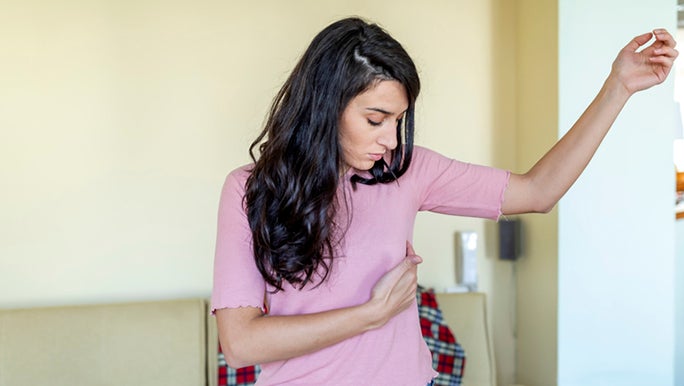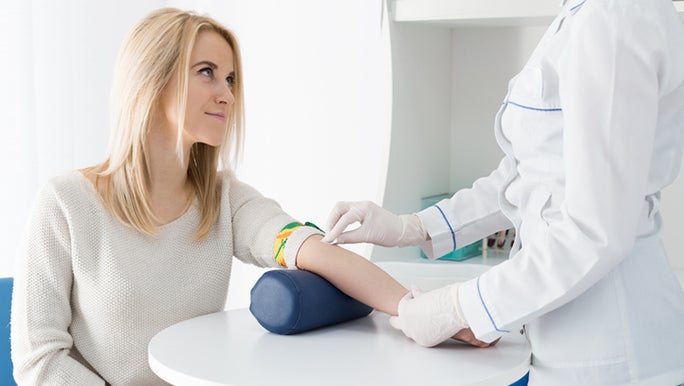Key Points
- There is a broad spectrum of ovulation signs: every person is different
- An increase or change in discharge can be a sign of ovulation
- You can ovulate before your period returns postpartum
Ovulation: generally, it’s something that happens to our bodies every month from adolescence to perimenopause. But many of us don’t learn to recognise the signs of ovulation until it’s time to start a family.
We asked GP Dr Jill Gamberg to explain exactly what ovulation looks like.
"A number of follicles are produced in the ovaries every month under direction from the pituitary gland hormones," she says. "The follicles stop growing around day seven of your menstrual cycle, except for one. This follicle continues to grow, supporting a maturing egg within it. Around day 12–14, the follicle swells, bursting open and expelling the egg."
What are the signs of ovulation?
When it comes to ovulation, there is a broad spectrum of symptoms.
Some people can experience:
- a change or increase in vaginal mucus (more about this below)
- abdominal bloating or pain
- breast tenderness
- increased sex drive
Let’s talk about discharge
Are you ready to get up close and personal with your vaginal discharge? If you want to know when you’re ovulating, Dr Jill recommends you start to pay it some attention.
“The research suggests we should look out for an egg white consistency, most probably with a clear appearance,” she says. “But everybody’s different, and as a GP we see a huge variation of what’s normal. If you’re concerned about your discharge, see your doctor.”
Heads up: you can still ovulate if you’re breastfeeding
Surprisingly, many people still (falsely) believe that you can’t get pregnant when you’re breastfeeding or if your period hasn’t yet returned post-baby.
If you’re exclusively breastfeeding, your baby is under six months old and your period hasn’t returned, you’re unlikely to ovulate. But, Dr Jill warns that it’s very hard to know where you are in your cycle if you have signs of ovulation while breastfeeding, but no periods.
“Really, at any point, you may have just ovulated and be due to get your period in the next few weeks,” she says.
This is why your GP will discuss contraception at your six-week check, before you return to sex.

Tender breasts can be a sign of ovulation
Paying attention to your body’s natural indicators is just one way to know when the egg drops. There is also a range of both physical and digital tools available.
For example:
- Ovulation kits are a great way to predict fertile windows. They work by measuring the level of luteinising hormone (a reproductive hormone produced by the pituitary gland) in your urine.
- Digital ovulation calculators and calendars may help to keep you informed and in control of your fertility journey.
- Many people monitor their basal body temperature as a way to track fertility.
For those undergoing fertility treatment, your doctor will look for signs of ovulation on ultrasound and via blood tests. These methods are also used to look for signs of early ovulation during IVF.

Blood tests and ultrasounds are used to check ovulation for people undergoing IVF
How to support healthy ovulation
Want to encourage healthier ovulation? Try:
- maintaining a weight within the recommended health guidelines
- exercising regularly (check out the best exercises when trying to conceive)
- managing stress and nurturing your mental health during the fertility journey
If you’re looking at embarking on a diet that supports fertility, you will find the recommendations are very similar to a regular healthy diet. Fresh fruit and veggies along with wholegrains and lean protein are key.
Concerned you may not be ovulating?
There are many reasons why ovulation may not happen, from menopause to medical conditions. If you have any concerns about your fertility journey, visit your GP.
Signs of ovulation after stopping the pill
The signs of ovulation after stopping the pill are the same as the regular signs of ovulation.
Sometimes it can take a month or two for ovulation to return to normal after stopping oral contraception. So if you’re not seeing the signs, ovulation may not have returned just yet – or you may be someone who doesn’t have obvious signs.

It’s possible to ovulate while breastfeeding but the signs can be more difficult to recognise
Trying to conceive? Get familiar with your cycles
When you’re trying to conceive, becoming familiar with your cycles is a great idea. Knowing when you’re likely to ovulate can help you make sure you don’t miss the opportunity.
If you have any concerns about your cycles or fertility journey, visit your GP. For tips on good nutrition to support fertility, see our ways to eat – focus on fertility program.
Related:
Jill Gamberg is a General Practitioner and Lifestyle Medicine Physician, with a Masters in Coaching Psychology. Dr Jill’s goal is to help prevent disease, improve health literacy and maintain psychological and physical wellbeing with evidence-based practice.
Reviewed by the healthylife Advisory Board December 2022.



